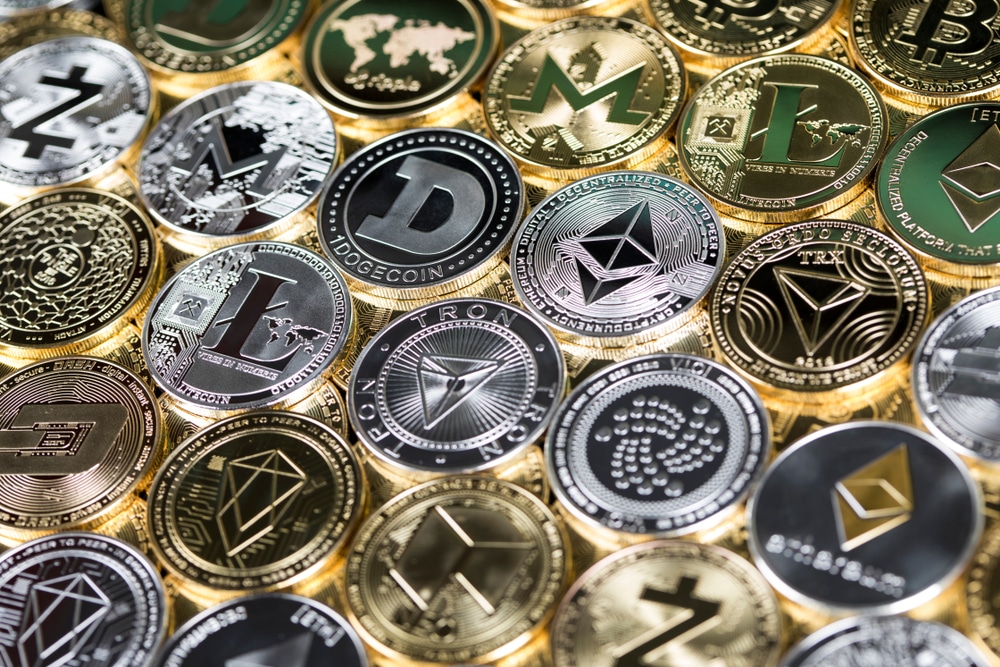Introduction
At present, there are thousands of cryptocurrency variants in the crypto space. For an average crypto investor recognizing the different types and use cases of cryptocurrencies is important.
Some cryptocurrencies are assigned a special function that plays an important role in deciding their value in the marketplace. In this article, the reader will learn about Governance Tokens and how to evaluate them based on their utility.
What is a Token?
(Advertisement)
CypherMind-HQ.com Artificial Intelligence Crypto Trading System – Get Ahead of the Curve with this sophisticated AI system! Harness the power of advanced algorithms and level up your crypto trading game with CypherMindHQ. Learn more today!
It is important to establish the definition of a crypto token before learning about Governance Tokens. A token is a type of cryptocurrency that is distinct from a crypto coin. In most cases, a crypto coin is the core or primary digital currency issuance of a blockchain like Bitcoin or Ethereum, etc.
However, crypto tokens are secondary digital currency publications of a blockchain project. For example, MATIC is a crypto coin for its native project Polygon.
However, since Polygon is hosted on the Ethereum blockchain, it is a crypto token for the dApps network. Just like tokens and coins, there are several other important classifications in crypto that every investor should know.
Types of Cryptocurrencies
Here are some basic and important classifications of cryptocurrencies:
Stablecoins are cryptocurrencies with a stable price point. Their value remains constant and they are pegged to the fiat currencies, commodities, or other cryptocurrencies to maintain their stable prices. Examples of stablecoins are BUSD, USDT, and USDC, etc.
NFTs stand for Non-Fungible Tokens. They can be media-based files or data compilations that can be minted using cryptographic technology. NFTs are unique and stand for digital ownership of an online entity that cannot be changed or replaced.
CBDCs
Central Bank Digital Currencies or CBDCs are cryptocurrencies that are private, non-permission, and centralized. They are issued and regulated by a Central Bank and they may not use DLT blockchains.
Utility Tokens
Utility Tokens are used to assign consumptive rights for services or product access using blockchain technology. Some examples of utility tokens are BNB, UNI, and BAT.
Yield Tokens
Yield Farming is a process of earning interest income by staking cryptocurrencies. Yield tokens are issued by the liquidity pools or other DeFi protocols as a reward for the staking position holders. CRV, CAKE, and AAVE are some of the top Yield Tokens.
Store of Value Tokens
Store of Value tokens are the ones that are most popular in the crypto space as a means of investment. Cryptocurrency investors can generate profits using long or short positions by converting their savings into the store of value currencies. The top store of value tokens is Bitcoin, Ethereum, Litecoin, etc.
Payment Tokens
Payment tokens are cryptocurrencies that are accepted as a means of the medium of exchange by retailers. Some of the biggest companies such as Tesla, AMC Cinema, and Shopify have enabled crypto payments for their consumers using third-party crypto payment platforms.
Security Tokens
Security Tokens are cryptocurrencies that are a digital stand-in for stocks or securities. They are subject to regulatory laws and can offer a stake in the ownership of the company that issues them in addition to dividend and profit-sharing options.
What is a Governance Token?
A Governance Token is also a type of cryptocurrency that is defined by its utility. Governance tokens are issued by the developers of a DeFi protocol for the stakeholders of the project. The governance token holders can possess voting rights and can play an important role in deciding the future of a given cryptocurrency protocol.
The token holders can participate in the voting process regarding new proposals or any other important decisions about the blockchain project in question that can affect the value and price momentum of a given cryptocurrency.
It is important to note that most blockchains aim to be a decentralized projects, which means that there is no central authority or private enterprise to govern the protocol. Therefore, the blockchain divides its administrative rights among its major stakeholders. The users who hold a larger number of cryptocurrencies are likely to have more voting power.
The voters can have a say in important aspects related to the blockchain protocol such as the budget proposals, updates, APY, and new features, etc. Governance tokens are a key administrative components for DAOs or Decentralized Autonomous Organizations.
How do Governance Tokens Work?
In a normal company that is regulated and under private ownership, there is a nominated board of directors group or shareholders that make the decisions. These groups with administrative power over the company are provided with all the data and facts concerning the progress of a given enterprise.
At the same time, they have control over all the strategic decisions that are needed to steer the corporation. Since private corporations are regulated, it means that the government and centralized financial agencies can also influence the decisions and direction of these enterprises.
However, a DAO is a decentralized DeFi entity. Therefore, it is free from regulatory implications and or any private board. Therefore, there is a need to appoint a group to make important decisions regarding the protocol.
For this reason, DAOs distribute Governance Tokens for token holders or cryptocurrency investors. By becoming the holder of Governance Tokens, these crypto stakeholders can become voters in all the decisions about the DAO. The project allows its community members to post new proposals.
The voters are notified about every new proposal and they have the option to express their opinion by voting for or against the proposal using their Governance Tokens.
The Governance Tokens are issued by blockchain and they ensure the distribution is immutable, unbiased, automated, and transparent. In most cases, the amount of voting power a crypto investor holds depends on the amount of their investment or token ownership in the project.
If a crypto investor holds 100 coins their voting power will be twice as much as an investor who holds 50 coins. However, Governance Token distribution can differ from project to project.
The Governance Token holders can vote on proposals regarding revision or assignment of devs funds, UI ideas, reward distribution mechanisms, transaction fees gas structure, updates and mergers.
Origin of Governance Tokens
The first issuer of Governance Tokens is an Ethereum-based DeFi protocol called MakerDAO. MakerDAO is a decentralized application that is used for peer-to-peer borrowing, lending, and savings. The native token issued by MakerDAO is DAI which is a stablecoin.
However, MakerDAO issues another token called MAKER which is used as a governance token. The holder of one MAKER token represents one vote and the more DAI tokens investor holds the greater their MAKER reserves.
Voters have the option to express their opinions on proposals about the stability, efficiency, and transparency of the MakerDAO protocol. The Compound is another DeFi protocol that is counted among the first governance token issuers. The Compound is also a crypto lending forum and its main token COMP is also used as a governance token.
However, COMP tokens are issued based on the active time or physical investment of investors on the protocol rather than their crypto reserves. COMP token holders can also delegate their tokens to others to vote on their behalf.
Types of Governance Token Structures
There are two basic types of governance tokes based on the blockchain structure given:
On-Chain Governance
On-chain governance takes place when the governance protocol has been integrated into the mainframe of the blockchain programming. It means that all decisions based on governance tokens can be carried out in real-time and translated into readable code.
Tezos is working on switching to on-chain governance. In this manner, the developers of the protocol will be able to post proposals on-chain and the voters could react in real-time.
If the proposal gets a majority approval they can be implemented or vice versa. However, after the first round of voting a final round of voting is carried out on the mainnet.
At present, there are some issues in the on-chain governance mechanism that can grant a few stakeholders undue advantage over others. Therefore, developers are working on addressing these issues before adopting this governance model.
Off-Chain Governance
The off-chain government takes place by offering governance rights to the users on the social platforms and other off-chain forums. The developers collect the response from the stakeholders of the network and encode them into the main frame of the blockchain network later.
Some of the biggest blockchain projects such as Bitcoin and Ethereum use off-chain governance mechanisms. Ethereum collects its improvement proposals from GitHub and the improvement proposals for Bitcoin are collected using the mailing list method.
Off-chain government is considered more reliable on account of the greater number of checks and balances in comparison to the on-chain governance style.
In the end, miners weigh the total votes and decide whether to carry out a proposal or discard it. In off-chain governance, investors may also sell their governance tokens or delegate them.
Advantages of Governance Tokens
Every cryptocurrency investor can wonder about what types of benefits they get for receiving Governance tokens. To answer this question here is the list of important advantages that governance token holders can enjoy:
Democratic Voting
The voters in any DeFi community can take advantage of a democratic mode of decision-making. In a company when shareholders purchase stocks, they can elect a board of directors to make the best decisions.
In the same manner, the governance token holders can vote to express their opinions or delegate their voting power to an elected developer or miner to vote on their behalf. In this manner, the protocol is run using a democratic method.
Decentralization Assurance
Most blockchain projects claim to be decentralized but they have key administrators such as miners and core developers etc. However, using the governance token method the protocol can ensure its decentralized status.
The DeFi projects that have adopted the governance token method do not have to operate as a private enterprises anymore. They can be fully owned by the stakeholders and do not require any centralized governing body to keep working.
Community Collaboration
Community collaborations are one of the most prominent benefits to come out of a blockchain project. The cryptocurrency holders that possess governance tokens need to collaborate and communicate with each other.
In this manner, governance tokens promote cooperation and interaction between community members. The more the token holders communicate with each other the better they can work alongside and understand the needs and requirements to run the protocol successfully.
Governance Efficiency
With the help of governance tokens, DeFi projects can enjoy greater governance efficiency in comparison to centralized enterprises. In many cases, the shareholders or clients of a given company have no say in the operational methods and decisions.
The users can only accept the products and services that have been given by the company. However, with governance tokens, the users can make informed decisions by reading the proposals and the effect of carrying out or denying a new proposal.
Transparency and Equality
In most cases, voting rights are granted to the users based on their wealth and monetary contributions.
However, there are DeFi protocols such as Compound where the voters can have greater power based on the time they invest in the project rather than the size of the crypto reserves. In this manner, governance tokens ensure transparency and equality among the voters.
Limitations of Governance Tokens
Here are some of the drawbacks that crypto investors should not ignore if they have governance tokens:
Undue Advantages
There are governance styles such as on-chain mechanisms where there is a margin for exploitation. On account of technical vulnerabilities, the threat actors can become governance token holders and carry out decisions that benefit them at the expense of the community members.
Therefore, if threat actors target a governance protocol with the intent to exploit it, they can wreak havoc and drive the project into the ground.
Whale Supremacy
In most governance token protocols, the amount of voting rights is directly proportional to the value of the total crypto investment. It means that whale investors have an upper hand by default.
In this manner, the voice and opinions of the retail investors can drown or hold little value in comparison to the whale stakeholder. Such a situation can lead to corruption and power imbalance that disregard the democratic intent of governance tokens.
Lack of Accountability
The governance token holders do not have any accountability regarding their decisions. It is impossible to question them or hold them accountable for wrongful or biased voting. Even if a DeFi project suffers from losses or goes out of commission, there is no legal precedent for bringing those responsible for the decision to take responsibility.
Qualification Criteria
The governance tokens do not have a way to ensure the qualification of a crypto investor to make decisions before assigning them the governance tokens.
It means that many governance token holders may not have any technical knowledge or understanding of the financial markets and still have the power to cast votes. If there are enough unqualified voters, the governance token mechanism can do more harm than good.
Governance Tokens vs Regular Tokens
Governance tokens can also possess other benefits in addition to voting rights. For example, some governance tokens are also utility tokens that grant access to exclusive products and services for holders. In some cases, voting rights can also be considered a utility.
To this end, the governance token holders can decide the direction of a DeFi project and steer its development orientation.
Some cryptocurrencies have only the main native currency that can work as de-facto governance tokens. The developers of the project have to collect the feedback of these investors using an off-chain governance model and they ingrain the response to a new proposal later in the blockchain.
However, there is an option for the off-chain governance protocol users to delegate or transfer their voting powers to a more qualified stakeholder. In return, they can get rewards for delegation in the form of yield tokens or other crypto rewards.
It is important to note, that governance token holders also have ownership over a given protocol. Therefore, they hold more power over the protocol than just voting rights. As mentioned before, there are several types of cryptocurrencies associated with a single blockchain or DeFi protocol.
The governance token holders can have the power to control all of these cryptocurrency types on account of their ownership over the protocol. However, it is important to note that not all governance tokens are eligible for trading on-the-spot markets.
Conclusion
There is considerable debate on the authenticity of a decentralized enterprise. However, the next phase of technological evolution is a world where most computing programs and software are autonomous and self-governing.
Therefore, many people believe that DAOs are the future of technical progress and for this reason; they consider that governance tokens are going to become more common.
However, it is not possible to say at present the shape and state of governance tokens that will prevail in the future. The cryptocurrency investors should learn about how much value and utility a governance token offers them to make the best trading decisions.



